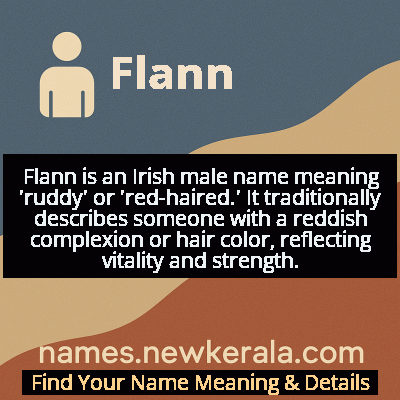Flann Name Meaning & Details
Origin, Popularity, Numerology Analysis & Name Meaning of Flann
Discover the origin, meaning, and cultural significance of the name FLANN. Delve into its historical roots and explore the lasting impact it has had on communities and traditions.
Name
Flann
Gender
Male
Origin
Irish
Lucky Number
2
Meaning of the Name - Flann
Flann is an Irish male name meaning 'ruddy' or 'red-haired.' It traditionally describes someone with a reddish complexion or hair color, reflecting vitality and strength.
Flann - Complete Numerology Analysis
Your Numerology Number
Based on Pythagorean Numerology System
Ruling Planet
Moon
Positive Nature
Diplomatic, friendly, artistic, empathetic.
Negative Traits
Over-sensitive, moody, indecisive, prone to self-pity.
Lucky Colours
Green, cream, white.
Lucky Days
Monday.
Lucky Stones
Pearl, moonstone.
Harmony Numbers
1, 3, 4.
Best Suited Professions
Diplomats, mediators, caregivers, artists.
What People Like About You
Cooperative spirit, friendliness, artistic talent.
Famous People Named Flann
Flann O'Brien
Writer
Celebrated Irish novelist and satirist, author of 'At Swim-Two-Birds' and 'The Third Policeman'
Flann Sinna
High King of Ireland
King of Mide and High King of Ireland who reigned from 879 to 916 AD, known for his military campaigns and political leadership
Flann Mainistrech
Poet and Historian
Chief poet of Ireland and lector at the monastery of Monasterboice, author of significant historical poems
Name Variations & International Equivalents
Click on blue names to explore their detailed meanings. Gray names with will be available soon.
Cultural & Historical Significance
In Christian tradition, Saint Flannan was a 7th-century Irish bishop who became the first bishop of Killaloe and is venerated as a patron saint of the Diocese of Killaloe. The name's association with both secular leadership and religious devotion reflects its versatility in Irish culture. Throughout medieval Ireland, Flann remained a prestigious name, often given to sons of noble families who were expected to embody both physical strength (suggested by the 'ruddy' meaning) and intellectual capability.
The name's persistence through centuries of Irish history demonstrates its enduring cultural significance, serving as a living connection to Ireland's Gaelic past while adapting to changing times. It represents a continuity of Irish identity that has survived colonization, famine, and modernization, making it more than just a personal identifier but a symbol of cultural resilience.
Extended Personality Analysis
Individuals named Flann are often perceived as possessing a strong, grounded personality with natural leadership qualities. The name's historical association with kings and scholars suggests someone who combines practical wisdom with intellectual depth. They tend to be reliable, steadfast individuals who approach challenges with determination and resilience. The 'ruddy' connotation may also imply a certain vitality and physical presence that commands respect.
Flanns are typically thought to be independent thinkers with a strong sense of identity and cultural connection. They often exhibit loyalty to their principles and communities, while maintaining the courage to stand apart when necessary. Their personality often blends traditional values with innovative thinking, making them effective in roles that require both respect for heritage and vision for the future. The name carries an air of quiet confidence rather than overt flamboyance, suggesting someone who leads by example rather than proclamation.
These individuals are often seen as bridges between tradition and modernity, comfortable with both historical knowledge and contemporary challenges. Their personality tends to reflect the name's dual nature—both strong and thoughtful, both rooted and forward-looking. This balance makes them particularly effective in leadership positions where they must honor the past while building for the future.
Modern Usage & Popularity
In contemporary times, Flann remains a distinctly Irish name that has maintained its traditional character while experiencing modest revival among parents seeking authentic Gaelic names. It's not among the most popular Irish names but holds a special place as a choice that honors heritage without being overly common. The name is primarily used in Ireland and among the Irish diaspora, particularly in families with strong cultural connections. Recent years have seen increased interest in traditional Irish names, which has brought renewed attention to Flann among parents looking for names with historical depth and cultural significance. While it hasn't reached the mainstream popularity of names like Liam or Sean, it occupies a respected position as a 'serious' Irish name that conveys both tradition and individuality.
Symbolic & Spiritual Meanings
Symbolically, Flann represents the fusion of physical vitality and intellectual strength. The 'ruddy' quality suggests not just physical appearance but also health, vigor, and life force. In Celtic symbolism, reddish hues were often associated with warriors and leaders, connecting the name to themes of courage and authority. The name also carries symbolic weight as a bridge between ancient pagan traditions and Christian Ireland, representing continuity and cultural preservation. It embodies the Irish ideal of combining practical capability with scholarly wisdom, making it symbolic of balanced leadership and cultural stewardship. The name serves as a living connection to Ireland's complex history, symbolizing both the strength to endure hardship and the wisdom to preserve cultural identity through changing times.

